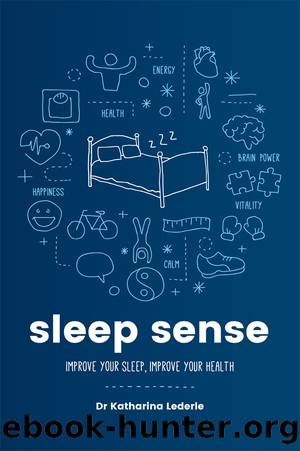Sleep Sense by Katharina Lederle

Author:Katharina Lederle
Language: eng
Format: epub
Publisher: Exisle Publishing PTY Ltd.
Published: 2018-10-15T00:00:00+00:00
We are poor judges of our own sleepiness
While reading about cognitive impairment due to lack of sleep, has a thought along the lines of âSleep deprivation doesnât affect me at allâ crossed your mind? I ask because many people say this to me. And yes, thereâs variability in how well people can cope with a lack of sleep (i.e. how soon and to what degree their cognitive performance will be affected). A small number of people are more resilient to the cognitive effects of sleep loss (genetics probably play an important role here), and you might be one of them â âthe exception that proves the ruleâ as the saying goes. For the majority of us, though, performance and productivity suffer if we get too little sleep. The âproblemâ we have as humans is that we struggle to accurately judge our own level of sleepiness. What complicates matters is that while we can easily picture and describe a drunk person, we find it harder to do so for a sleep-deprived person.
There are two interesting research studies I would like to share with you in this context. The first investigated the effects of chronic sleep loss and how it impacts your performance. Here, they also looked at how you perceive your performance when sleep deprived. (I briefly touched on this topic in Chapter 1 when answering the question âHow much sleep do I need?â on p. 26.) Participants were divided into three groups who were allowed to sleep for, respectively, a maximum of four hours, six hours or eight hours a night for fourteen nights. A fourth group didnât sleep at all for two nights. At specific times throughout the study, participantsâ performance was measured objectively and they were asked to rate their own level of sleepiness at the same time. The results from the performance assessment showed that scores declined across the study period: the shorter the sleep time, the worse the scores. Those sleeping six hours or less for a prolonged time (in this case, fourteen nights) showed comparable performance degradation with those not sleeping at all for two nights.
What about the subjective sleepiness ratings? For the first four days, participants said that their sleepiness was increasing slightly, which matched their decline in performance. But then their ratings plateaued and participants said they did not get any sleepier â despite missing out on even more sleep. What was going on? Did they adapt to the lack of sleep? No, they didnât. As I told you, when measured objectively performance continued to decline across the fourteen days. What had changed was their sense of their own sleepiness and their ability to judge it accurately.
The three key messages from this study are:
+
Over time, even a small to moderate decrease in sleep duration can cause the same decline in performance as a whole night with no sleep.
+
People donât adapt to insufficient sleep. Many of us for one reason or another only sleep for six hours, which may be enough for some but the majority of us need at least seven hours.
Download
This site does not store any files on its server. We only index and link to content provided by other sites. Please contact the content providers to delete copyright contents if any and email us, we'll remove relevant links or contents immediately.
Men In Love by Nancy Friday(4359)
Everything Happens for a Reason by Kate Bowler(4080)
The Immortal Life of Henrietta Lacks by Rebecca Skloot(3839)
Why We Sleep by Matthew Walker(3794)
The Sports Rules Book by Human Kinetics(3609)
Not a Diet Book by James Smith(2750)
The Emperor of All Maladies: A Biography of Cancer by Siddhartha Mukherjee(2445)
Sapiens and Homo Deus by Yuval Noah Harari(2431)
Day by Elie Wiesel(2255)
Endless Forms Most Beautiful by Sean B. Carroll(2094)
Angels in America by Tony Kushner(2057)
A Burst of Light by Audre Lorde(1987)
Hashimoto's Protocol by Izabella Wentz PharmD(1907)
Dirty Genes by Ben Lynch(1866)
Reservoir 13 by Jon McGregor(1862)
Stretching to Stay Young by Jessica Matthews(1721)
The Immune System Recovery Plan by Susan Blum(1706)
Fat for Fuel by Joseph Mercola(1702)
Boost Your Brain Power in 60 Seconds by Michelle Schoffro Cook(1683)
